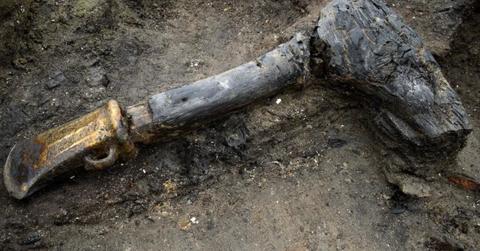British Pompeii: 3,000-Year-Old Bronze Age Village Reveals Advanced Domestic Life of Inhabitants

A metal axe head with wooden shaft was among the many well preserved artifacts discovered at Must Farm, where Fen folk lived 3,000 years earlier in lives of surprisingly domesticity.
A glimpse into the cozy domestic life of a Bronze Age village in Britain has emerged from the marshlands where homes were perched on stilts, offering protection from the surrounding waters.
This settlement, known as Must Farm in the United Kingdom and dated to around 850 BC, met a fiery end less than a year after its construction.
Dubbed "Britain’s Pompeii," Must Farm has yielded thousands of artifacts providing insights into the daily lives of its inhabitants some 3,000 years ago.
Over 55 archaeologists from the University of Cambridge meticulously excavated the site between 2015 and 2016, uncovering a wealth of items ranging from culinary recipes and attire to beloved pets and kitchen implements.
Surprisingly, the Fen folk, as they are known, led comfortable lives.
Archaeological evidence points to meals featuring delicacies like "honey-glazed venison," while garments crafted from flax linen adorned their bodies. Even a rudimentary form of recycling was evident in the discovery of a designated bin.
Among the finds were spears with shafts nearly 10 feet long and a necklace adorned with beads originating from distant lands like Denmark and Iran.
The village itself comprised four sizable wooden roundhouses and a square entranceway structure, all erected on stilts above a river near Whittlesey, East Anglia.
Standing about 6.5 feet above the water, the settlement was enclosed by a 6.5-foot fence fashioned from sharpened posts.
The roundhouses boasted roofs made of straw, turf and clay, providing warmth and waterproofing while maintaining adequate ventilation.
Dr. Chris Wakefield, project archaeologist with the Cambridge Archaeology Unit, remarked on the coziness of these dwellings, particularly during harsh winters in the Fenlands.
Although only a portion of the settlement remains due to 20th-century quarrying, it's estimated that Must Farm could have accommodated up to 60 individuals in family units.
Never miss a story — sign up for the Front Page Detectives newsletter. Be on the scene the moment news breaks.
The catastrophic fire that consumed the village preserved much of its structure and contents, thanks to a combination of charring and waterlogging. Mark Knight, co-author of the excavation report and director of the dig, praised the ingenuity of the village's builders in adapting to the waterlogged landscape.
David Gibson, archaeological manager at CAU and another report co-author, likened studying Must Farm to a tour of a Bronze Age stilt house.
Artifacts recovered from the roundhouses included a metalwork "tool kit" comprising sickles, axes, gouges and razors, alongside implements for textile production.
The remains of lambs found in the fire suggest the settlement met its end in late summer or early autumn. Traces of honey and ruminant meats detected on pottery vessels hint at culinary practices, including the preparation of honey-glazed venison.
Evidence of small dog skulls indicates domestication, possibly for hunting purposes. The cause of the fire remains uncertain, though Gibson speculates that such settlements may have had a limited lifespan, prompting their inhabitants to rebuild elsewhere.
Become a Front Page Detective
Sign up to receive breaking
Front Page Detectives
news and exclusive investigations.
